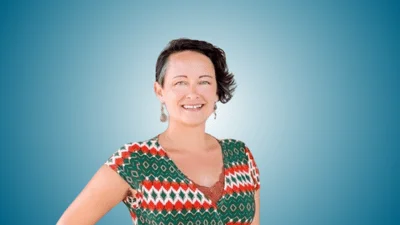Watching Susan DeLeo’s short film Island is like bathing. Bathing not in the sense of taking a bath, but in the sense of Forest Bathing, Shinrin-yoku in Japanese culture, the practice of immersing oneself in an environment, an engagement of the senses within an ecosystem.
 Susan DeLeo. Provided by the artist
Susan DeLeo. Provided by the artist
The Experiments in Cinema program describes Island as “an exploratory journey through an island off the coast of Boston, Massachusetts, previously inhabited by prisoners of war. It is a portrait of a place conceived through Super 8mm film, and the impressions left on the filmmaker from a day’s visit to this abandoned and fascinating site.”
For 3:43 seconds, one is taken on a voyage, a symbolic navigation between captivity and creative freedom.
Experiments in Cinema founder Bryan Konefsky calls DeLeo’s work, “Beautiful, atmospheric, and gentle on the soul.”
 Experiments in Cinema advertisement
Experiments in Cinema advertisement
I catch up with DeLeo before her showing at the 20th anniversary of Experiments in Cinema in Albuquerque, New Mexico to ask about the film and her artistic practice.
Tell us about Island. What is the general visual and narrative tone and theme of the work?
It’s an overall impression from my visiting this island. The tone is perhaps mysterious and multi-layered working with metaphors of water, isolation and decay, and is a meditation of sorts.
What inspired Island? At what point did you know your visit to the island required an artistic expression?
Having lived in Boston most of my life, I was always drawn to the Harbor Islands. I was inspired by the beauty of the place itself and felt compelled to return several times to explore and film there using a Super 8 camera. It is a very haunting environment. In the 1800s a fort was built on George’s Island to defend Boston Harbor and then was used briefly as a prison. The abandoned structures consist of dark rooms, tunnels, and corridors, all in a state of decay surrounded by the ocean, making for a very mysterious place.
Responding intuitively with my camera to the eeriness, the harsher aspects as well as to the beauty, I was feeling into what it might have been like to have lived there in these contrasting elements as well as my own immediate responses. What interested me was the psychological and emotional atmosphere rather than the political or social implications.
As an experiential filmmaker, how do you see your artistic practice compared to the broader approach of feature filmmakers? Would it be akin to poetry analogous to the novel?
Absolutely. It is more like experiencing fragments of a dream or a memory. My films are often short non-linear intuitive impressions from something I’m observing or sensing, especially in nature. I’m interested in how nature can be a vehicle for more ethereal transcendent experiences.
I’m also a musician and sense my films come from a similar place of fluidity and repetition. I often compose the soundtrack for my films either alone or collaboratively. I’m not that interested in working with a script or actors in a linear way or trying to tell a straight up story. I like to create more of an atmosphere and trance-like state that the viewer can be immersed in.
For more information on the work of Susan DeLeo, visit her website at https://www.susandeleo.com.
For more information about Experiments in Cinema and Basement Films, go to: https://www.basementfilms.org.
Brian C. Nixon, Ph.D., is Chief Academic Officer and professor at Veritas International University in Albuquerque. As a writer, musician, and artist, his interests surround the philosophical transcendentals: truth, beauty, and goodness. You can contact Brian via his Bandcamp email address: https://briancharlesnixon.bandcamp.com








